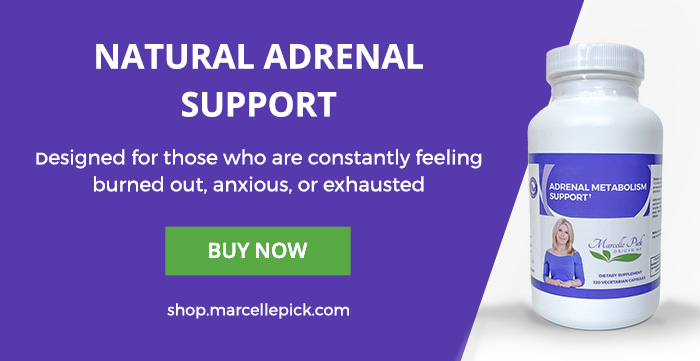Updated 05/07/2023
My client, Tricia, was well versed in the issues adrenal imbalances can create.
But just like… well, pretty much everything else, adrenal fatigue can feel different depending on what hormonal stage of your life you’re in.
Tricia began experiencing signs of adrenal fatigue many years ago, and I worked with her to help her support her adrenals and feel good again.
Because we caught it early, healing came easily with some lifestyle and dietary changes. And because she knew what symptoms to look for, she was able to stay healthy for many years.
But a few weeks ago, she was back in my office. She said she was feeling exhausted again, and the things she’d done before just weren’t helping as much.
Because she’s in her mid-50s, I asked if anything had been different in her menstrual cycles recently, and she shared that her periods weren’t as regular as they used to be. I dug deeper, and she revealed that although she’d sustained some lifestyle changes long term, the stress in her life had continued to build.
And of course, the pandemic and concern over the general state of the world didn’t help.
After hearing these things, her symptoms made sense to me. Although we’d worked together before, she’d been younger and was able to handle stress differently. Now, she’d moved beyond the early phases of adrenal dysfunction and was headed towards the most advanced stage. Luckily, once I realized what was happening, I could help.
As a woman, as you move through various hormonal stages in your life, keeping your adrenals healthy can be complicated and frustrating– unless we understand how the body’s ability to handle stress changes as we age, particularly when we enter new hormonal phases such as perimenopause or menopause.
There are several stages of adrenal fatigue. I most often refer to three: Tired, Wired, or Tired and Wired. Each has distinct symptoms, and where we are in our lives can be a major factor in which stage we reach when dealing with adrenal dysfunction.
That’s because our ability to handle stress shifts as we get older, and the hormonal changes that come with perimenopause and menopause have an impact on the essential hormones that the adrenals produce (and I’m not just talking about cortisol).
Let’s look at the different stages of life and the connection with adrenal function, and then I’ll give you some natural ways to support your adrenals throughout all these stages.
Adrenal dysfunction in the earlier life
With the onset of a menstrual cycle, even young girls can be vulnerable to hormonal changes that put stress on the adrenals. Adrenal dysfunction in teenagers and women in their early twenties is far less common, however, because their bodies usually haven’t experienced the type of constant stress that is behind adrenal problems. And even if they are faced with major stressors, the rest of their body systems are still functioning as they should. If levels of the hormones produced by the adrenals become slightly imbalanced, the body can correct itself more easily.
Our bodies are equipped to handle stressful situations with a normal stress response. When faced with real or perceived danger, your adrenals release hormones like cortisol, adrenaline and norepinephrine.
Unfortunately, there’s no difference in response whether the stressor is severe (like you’re being chased by a wild animal), mild (like someone cut you off in traffic) or even enjoyable (like a roller coaster ride).
Most younger women haven’t reached a dysfunctional stage, though they may notice energy fluctuations, feeling a little jittery, digestive trouble, or sleep difficulties. These are all early warning signs. If you can get a handle on the stress in your life quickly, adrenal dysfunction is far less likely to become an issue.
Adrenal issues before menopause
If you haven’t yet reached perimenopause, you’re more prone to hyperactive adrenals, and thus may find yourself in the “Wired” stage of adrenal dysfunction. Building your career, navigating relationships, having young children, and so many other big things you might be going through can prompt that overactive stress response.
When these high levels of stress linger, you may end up with a consistently high supply of cortisol and adrenaline in your system– and this can leave you feeling worn out but also unable to stop.
Are you nodding along? I know so many women who can relate to this!
But I see it most often in this stage of life. I think of it as being like the “superwoman” phase of life. And being able to get so many things done might even feel satisfying…until the crash.
The big problem here is that your body is overproducing cortisol, but other important hormones are being put on hold so that your adrenals can keep up. That means levels of other essential hormones, like DHEA, are starting to fall. And that can set off a chain reaction in your body.
In addition to feeling always “keyed up,” in this phase you may experience…
- Trouble sleeping
- Anxiety
- Restlessness
- Increased susceptibility to colds or infections
If you catch the problem in this phase and use some of the tips below to help get your hormone levels back where they belong, you can usually avoid the more severe dysfunction – like Tricia did for years.
Adrenal dysfunction in perimenopause and menopause
When women begin to experience major hormonal changes, underactive adrenals, rather than overactive adrenals, are more often the problem.
This is partly due to your naturally changing levels of estrogen and progesterone, and the role of your adrenals in producing these hormones when it’s time for your ovaries to stop. The problem, of course, is that if the adrenals are still so busy pumping out cortisol, they can’t take over.
That means levels of other important hormones drop – and that’s a stressor to your body. Remember what I said about stressors? They make your body release more cortisol. It can quickly become a nasty cycle.
That is why women in perimenopause and menopause often find themselves in the later phases – either Tired and Wired, or just plain Tired.
Each phase is more advanced than the last, but that doesn’t mean there’s nothing you can do. I’ve helped and seen women heal from adrenal fatigue in all stages. What’s really important is understanding where you’re at!
If you’re in perimenopause or menopause, and a later stage of adrenal fatigue, your body has essentially become used to the chronic stress. This feels like just the way life is.
And that can lead to problems in multiple body systems. When stress is priority number one, other things – including reproduction, digestion, and immune function – are put on hold.
When overproduction of cortisol becomes the norm, eventually, your body just can’t keep up. The adrenals, in essence, start to under produce cortisol.
Symptoms may include:
- Extreme fatigue
- Fuzzy thinking
- Moodiness or irritability
- Low sex drive
- Hormonal imbalances
- Sleep problems
As you move into the Tired phase, the most serious stage of adrenal dysfunction, your body just can’t produce very much cortisol at all. When this happens, daily life becomes a major struggle.
This is more apt to happen in perimenopause or menopause because you’ve been dealing with the stress for years – and it’s still coming at you.
You may be at the peak of your career, juggling the needs of children and aging parents, worried about the state of the world, thinking about the financial strain of sending your children to college, experiencing shifts in your relationship, and so much more.
And the thing is, you just don’t have the same hormonal reserves as your younger counterparts.
Trust me, I get it!
But sometimes women (and, unfortunately, their doctors) dismiss these symptoms as “normal” signs of menopause– and miss the adrenal issues altogether!
In these later stages, the simple changes you made when you were younger may not have the same impact. Like Tricia, you may find yourself frustrated that the way they learned to manage symptoms isn’t working anymore. So let me show you exactly what you can do– no matter what stage of adrenal fatigue and life you’re in.
Supporting the Adrenals Through Every Hormonal Stage
Though severe dysfunction will take more time and commitment, adrenal health can be restored at any stage and any age! Let’s take a look at some steps that can make a big difference:
Eating for adrenal health
Because sugar and caffeine are false energy boosts, one of the first things I recommend is to cut back (and eliminate if possible) on both. The problem with the quick pick-me-up they offer is that it doesn’t last long…and the crash can be worse than the fatigue you felt in the first place. Eating whole, unprocessed foods is the best way to support your adrenal health. You can learn more about exactly what to eat (and NOT eat) in my article here.
Give yourself a boost with targeted supplements
Supplements can help ensure you get all the nutrients and minerals you need every day. At the very least, I recommend that women take a high-grade multivitamin complex, as well as fish oil.
Depending on the stage of dysfunction you are in, some more targeted support for the adrenals through supplementation may be required.
I’ve actually put together two supplement bundles, based on my clinical experience, to specifically help you when you’re feeling more Tired or feeling more Wired.
Take time for yourself
So often, women are so busy doing for others that they neglect themselves altogether. Don’t let this happen! Finding time to do the things you want to do is just as important (even more so) than for the things you have to do. I also recommend examining those “have-to” list items. Is it truly something you can’t avoid, or do you just need to learn to say no? Making a list of stressors can help you focus on what you may need to change in order to give yourself the attention you deserve.
Protect your sleep
This can be frustrating to hear when part of the problem is that you are having sleep difficulty. But it’s extremely important to adrenal health that you allow your body the time to rest and rejuvenate itself. Often there are simple changes that can reduce the difficulties you are having going to (or staying) asleep.
Heal emotional trauma
Emotional stress is just as damaging as physical stress. If you haven’t released old pain, you may end up in self-destructive patterns that are harder to break the longer you use them to cope. Learning techniques for truly processing the emotional trauma in your past is crucial for true healing of the adrenals.
After reviewing my suggestions for managing adrenal dysfunction, Tricia realized she’d been missing a huge piece of the puzzle. She had long ago adopted healthy eating habits and an exercise routine. But she never took a look at the emotional side of things. As she entered perimenopause, she had been struggling with relationships more than ever. When she stopped to examine why, she noticed some startling negative patterns around how she handled her emotions. That was her first step toward healing, and she’s doing so much better now!
The hormonal journey of women lasts a lifetime. Knowing how to keep hormones balanced through the natural shifts is essential. Supporting adrenal health is a great place to start!








